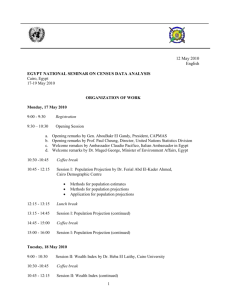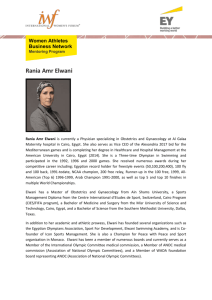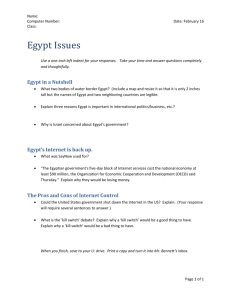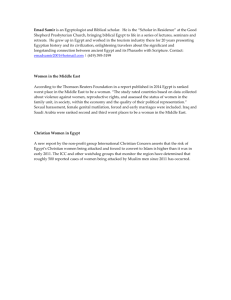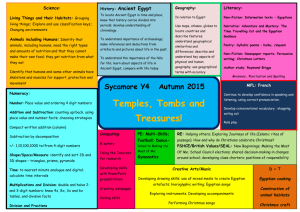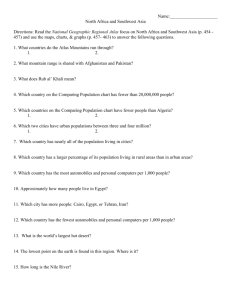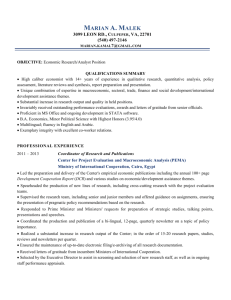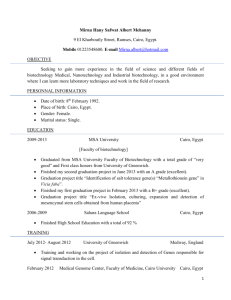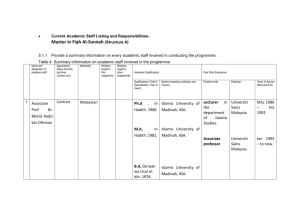Egypt Seminar - Hunter College
advertisement
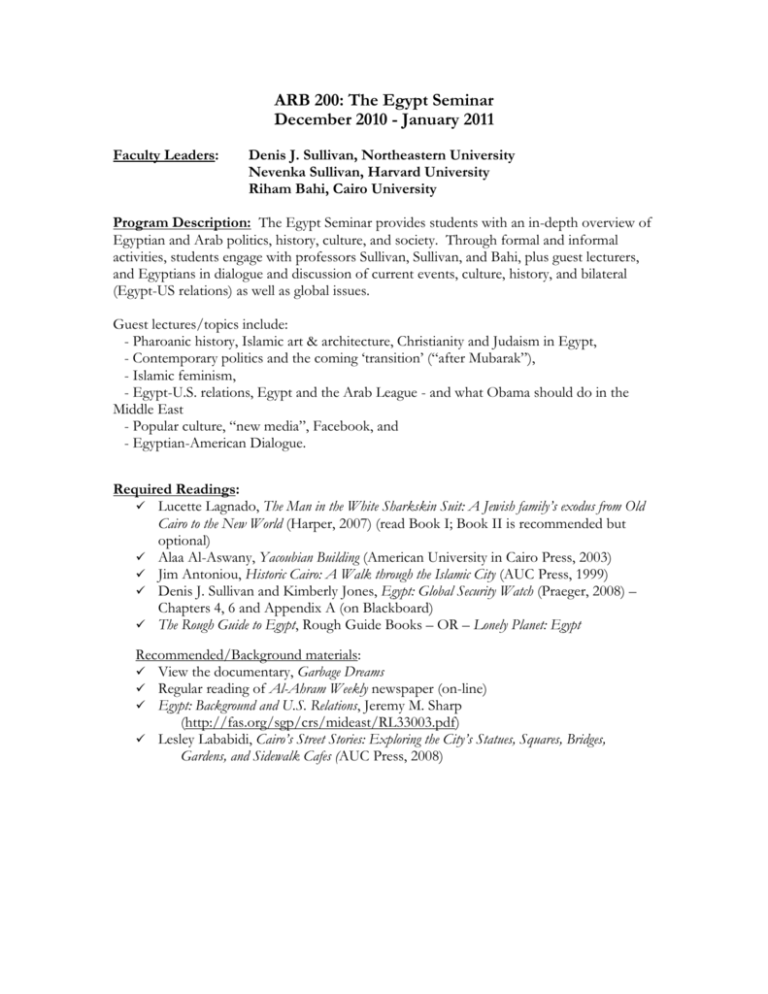
ARB 200: The Egypt Seminar December 2010 - January 2011 Faculty Leaders: Denis J. Sullivan, Northeastern University Nevenka Sullivan, Harvard University Riham Bahi, Cairo University Program Description: The Egypt Seminar provides students with an in-depth overview of Egyptian and Arab politics, history, culture, and society. Through formal and informal activities, students engage with professors Sullivan, Sullivan, and Bahi, plus guest lecturers, and Egyptians in dialogue and discussion of current events, culture, history, and bilateral (Egypt-US relations) as well as global issues. Guest lectures/topics include: - Pharoanic history, Islamic art & architecture, Christianity and Judaism in Egypt, - Contemporary politics and the coming ‘transition’ (“after Mubarak”), - Islamic feminism, - Egypt-U.S. relations, Egypt and the Arab League - and what Obama should do in the Middle East - Popular culture, “new media”, Facebook, and - Egyptian-American Dialogue. Required Readings: Lucette Lagnado, The Man in the White Sharkskin Suit: A Jewish family’s exodus from Old Cairo to the New World (Harper, 2007) (read Book I; Book II is recommended but optional) Alaa Al-Aswany, Yacoubian Building (American University in Cairo Press, 2003) Jim Antoniou, Historic Cairo: A Walk through the Islamic City (AUC Press, 1999) Denis J. Sullivan and Kimberly Jones, Egypt: Global Security Watch (Praeger, 2008) – Chapters 4, 6 and Appendix A (on Blackboard) The Rough Guide to Egypt, Rough Guide Books – OR – Lonely Planet: Egypt Recommended/Background materials: View the documentary, Garbage Dreams Regular reading of Al-Ahram Weekly newspaper (on-line) Egypt: Background and U.S. Relations, Jeremy M. Sharp (http://fas.org/sgp/crs/mideast/RL33003.pdf) Lesley Lababidi, Cairo’s Street Stories: Exploring the City’s Statues, Squares, Bridges, Gardens, and Sidewalk Cafes (AUC Press, 2008) This class will be graded according to the following: Coursework & Assignments: Prof. Sullivan will assess learning (and assign grades) based upon your (a) reading, writing, and other assignments; (b) activities and/or “products” (reports, websites, etc.); and (c) Portfolio. See below for details: 1. You will have four reading reviews. Each will consist of 2.5-3 pages single-spaced if typed, or equivalent if hand-written; provide a summary & critical analysis/critique of each of the following books: a. The Man in the White Sharkskin Suit, -- due December 31 b. Historic Cairo: A Walk through the Islamic City – due January 8 c. Yacoubian Building – due January 18 d. Egypt: Global Security Watch (select chapters)- due January 23 2. “Scavenger/Treasure Hunt” report: (details forthcoming) - Write a summary of your experiences while completing the search. (2 pages single-spaced typed). 3. Journal: You must maintain a personal “journal”. Start writing it in the US as you begin preparing for your program in the Middle East. Once in Egypt, write every day (or every other day at least). Capture the events, people, and places that you experience. This is your personal, private diary for yourself only. However, we will ask to see how much progress you are making throughout the program. 4. Snap Writing Assignments: At times, you will be given a “prompt” for an essay which will ask you to reflect more specifically on a particular lecture or event. (4 assignments; 1 page, singlespaced if typed, or equivalent if hand-written). 5. Reflection Paper: Using your journal entries, write a 4-5 page (single-spaced, typed) reflection paper that encapsulates your reflections, observations, conclusions, and selfexamination/self-assessment about your entire program – from pre-departure, to living in the Middle East, to your “re-entry” to the U.S. 6. Artistic Expression: Create a blog, website, photo album, or other creative expression that reflects a personal reaction or expression about your entire experience in the Middle East. 7. Final Portfolio (due January 31, 2011): Your final portfolio will consist of a 3-ring binder containing the following items as well as any notes you took during site visits and lectures or handouts you collected throughout the program: · Reading Reviews (1-4) · Treasure Hunt chart 2 Treasure Hunt report All Snap Writing Assignments/Worksheets Reflection Paper Your Artistic Expression will likely be submitted as a separate document (scrapbook or blog). · · · 8. “Attendance & Participation”* “Attendance & Participation” in all required activities is indeed “required”! i.e., not simply “showing up”, but showing up ready to engage with the people, the context, the events, and one another. This demands students to be rested, ready, and on time for all activities. It also demands an attitude of cooperation and willingness to participate. Weekly meetings with faculty leaders are included. * “Attendance & Participation” as well as “Behavior”: “Behavior” is observed and, when necessary, “graded” or otherwise acted upon, based upon college policy as well as standards of sensitivity to Egyptian culture. Assignment Schedule: (subject to change ) Week 1 (December 27 - January 2) · Journal writing - Pharoanic Egypt, “Greek Egypt” (Alexandria) · Visit Egyptian Museum (Note: no cameras allowed at Egyptian Museum!) · Read The Man in the White Sharkskin Suit. · Snap Writing Assignment: from Tourist to Student Week 2 (January 3 - 9) · Luxor · Snap Writing Assignment: Dialogue Week 3 (January 10 - 16) · Reading Review #2 Islamic City. · Read: Story of St. Simeon and Muqattam (before Coptic Cairo tour) · Students as Guides - Preparation/Writing Assignment: Coptic Cairo Week 4 (January 17 - 23) · Snap Writing Assignment: Arab League · Reading Review #3 - Yacoubian Building. · Reading Review #4 - Egypt: Global Security Watch Portfolio and Artistic Expression due January 31 3 Hunter College policy on academic integrity: Hunter College regards acts of academic dishonesty (e.g., plagiarism, cheating on examinations, obtaining unfair advantage, and falsification of records and official documents) as serious offenses against the values of intellectual honesty. The college is committed to enforcing the CUNY Policy on Academic Integrity and will pursue cases of academic dishonesty according to the Hunter College Academic Integrity Procedures. Statement from Student Services’ Office of AccessABILITY: In compliance with the American Disability Act of 1990 (ADA) and with Section 504 of the Rehabilitation Act of 1973, Hunter College is committed to ensuring educational parity and accommodations for all students with documented disabilities and/or medical conditions. It is recommended that all students with documented disabilities (Emotional, Medical, Physical and/ or Learning) consult the Office of AccessABILITY located in Room E1124 to secure necessary academic accommodations. For further information and assistance please call (212- 772- 4857)/TTY (212- 650- 3230). 4

